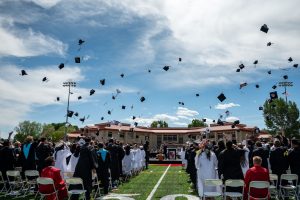Van Ens: Robert F. Kennedy campaigned to restore poor peoples’ dignity (column)
Valley Voices

After President John F. Kennedy’s assassination in late November 1963, staff cleared his desk in the Oval Office. Kennedy left one word on a sheet: POVERTY. The president’s brother Robert vowed to carry on this fight against poverty to deepen his brother’s legacy on race relations.
Shortly after attending a Monticello conference commemorating the 250th anniversary of Thomas Jefferson’s birth, my wife and I joined another observance on June 6, 1993, at Arlington National Cemetery. Remembering Robert F. Kennedy, a candle-lit Mass for Courage and Reconciliation was held, a quarter century after his assassination on June 6, 1968, ended RFK’s presidential bid.
Sitting among thousands on Arlington Cemetery’s grassy knolls, we participated in the Mass, led by members of the Kennedy family, 1960s Civil Rights activists and President William Jefferson Clinton.
RFK’s eldest child, Kathleen Kennedy Townsend, led us in a Call to Worship. She repeated her father’s soaring words on why he worked to eradicate poverty. “I come to ask you to help in the task of national reconciliation to place your energies and your time and your strength in the first work of America; the building of a nation united not on every issue, but in the enduring faith that we are to be free — that we are to have the chance for a decent life — that the natural condition is not degradation but dignity. This is the faith that binds us together as Americans,” declared Kathleen.
Earlier in his political career, RFK dodged helping poor people, as if broadening civil rights were as uncomfortable as wearing an ill-fitted suit. As attorney general during his brother’s presidency, Robert initially foot-dragged on civil rights for blacks. He didn’t want to offend segregationist Southern Democrats.

Support Local Journalism
In May 1963, Kennedy found that he couldn’t ignore urgent voices, such as black writer and activist James Baldwin. In a New York apartment, as racial tensions led to tumult, Kennedy endured a storm of criticism because he overlooked daily insults blacks endured.
Sharpening gifts of self-criticism and compassion for hurting poor people, Kennedy made a turnabout. He told newspaper commentator Anthony Lewis, “There are injustices, and they are flagrant. And I have the power and responsibility to do something about them. So, I intend to do it. It’s quite simple” (“Bobby sends out vast ripples of hope,” The Rocky Mountain News, June 2, 1998, p. 30A).
Robert F. Kennedy’s moral agenda kept restoring black dignity when many white Christians condemned Martin Luther King Jr. as a communist agitator. Southern Democrats protected their supremist, segregated traditions. Republicans pressed for law and order to crack down on ghetto uprisings. And most Americans believed themselves fair-minded in race relations. They took for granted that the 1964 Civil Rights Act and the 1965 Voting Rights Act would thwart prejudice.
Today, the same spirit of normalcy in race relations is taken for granted. George Yancy, who wrote “Backlash: What Happens When We Talk Honestly about Racism in America,” in the April 24, 2018, edition of Inside Higher Education, reports he “received a barrage of hateful reactions to a column he wrote in 2015, which argued that well-intentioned white Americans benefit from racism in ways they don’t detect or understand.
“Yancy believes that many Americans like to think of themselves as nonracist and like to believe that the civil rights movement ended systematic racism” (Christian Century magazine, May 23, 2018, p. 9).
Robert F. Kennedy’s courageous stands helped the helpless and comforted the poor. He took moral stands for fairness and equality, rather than merely standing in the right place and observing racism from afar.
The Rev. Dr. Jack R. Van Ens is a Presbyterian minister who heads the nonprofit, tax-exempt Creative Growth Ministries (www.thelivinghistory.com), which enhances Christian worship through dynamic storytelling and dramatic presentations aimed to make God’s history come alive.










